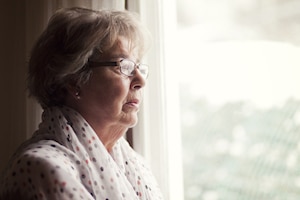Senior Isolation is one of the most commonly talked about and debilitating issues associated with aging. When living in isolation, seniors commonly deal with depression, lack of self-care, living in unsafe environments, slow emergency response, inadequate medical attention, and a lack of preventative care. These factors add up to a noticeable decrease in quality of life and overall longevity.
But the good news is that these potential problems associated with isolation are avoidable. The cure: simply regular social interaction.
1. Lack of Self-Care
Seniors that live in isolation can more easily fall into a cycle to improper self-care, due to depression and/or lack of physical ability. Everyday tasks like bathing and cleaning become more difficult as we age, and and especially when we age in isolation. Continuous lack of self-care tends to compound on itself, for example, a few missed showers can quickly lead to bed sores that limit mobility even further, making it more difficult to bath. A vicious cycle.
Other issues associated with improper self-care can include major dental issues, more frequent illnesses due to improper germ control, losing important muscle stability due to inactivity and decreased mobility, and unsafe amounts of clutter and unclean living conditions.
2. Unsafe Living Environments
2.8 million seniors are treated for falls every year, that equals a fall roughly every 11 seconds. One of the leading contributors to fall-related injuries is an improperly maintained, or overly cluttered living space. Carpets that are bunched-up on the edge, containers that aren’t in their usual spots, random articles of clothing, anything that is cluttering up the space can pose a major danger to seniors. When seniors live in isolated conditions, it is more common that they allow clutter to accumulate, and without attention this clutter becomes hazardous and will drastically increase the chances of a fall.
Unsafe living conditions can be remedied by regular visits from a professional caregiver. While regular housekeepers do help keep the home tidy, they rarely understand how to best arrange living conditions for senior safety AND overall cleanliness. Professional caregivers have received proper training and can most reliably maintain a safe living space for aging adults.
3. Slow Emergency Response
In the event of a fall, or a medical emergency, medical response time is typically much slower for isolated seniors. If there is nobody around to actually call in the emergency, or if the isolated senior is unable to get to the phone during an emergency situation, naturally the emergency services won’t know to offer assistance. Tools like the Life Alert system, or a cell phone help in these situations, but aren’t a replacement for daily check-ins and social interaction to make sure everything is alright.
4. Inadequate Preventative Care
Practicing proper preventative care is important at every age, but as we get older it becomes crucial. A cough that passes after a few nights of good rest at age 40 can easily develop into an upper respiratory infection, or worse, at age 75. It is easier to treat minor health issues in seniors when they are caught early. In addition, maintaining proper medication schedules, practicing smart and healthy nutrition habits, and exercising on a consistent basis are all major aspects of preventative care for seniors.
It can be difficult to identify exactly what someone means when they say seniors should practice better preventative care, and it can be even harder to figure out ways that you can actually encourage your loved one to practice preventative care, especially if they live on their own. Setting up regular visits from an in-home care professional is an increasingly popular solution. Whether it’s a visit twice monthly, or twice weekly; a trained professional can ensure that your loved one is handling their preventative care the right way.
5. Depression
A staggering number of seniors suffer from depression. It can compromise their immune systems, make daily tasks feel like insurmountable obstacles (leading to lack of self-care), and it can have a substantial negative effect on longevity. While depression isn't an issue exclusive to seniors, it becomes more of an issue in the aging community due to isolation and loneliness. People are social by nature, and isolation typically serves to worsen depression, or create it where it never existed in the first place.
Support Your Loved Ones
It can be difficult to figure out exactly how we can help loved ones do things like maintain good hygiene or light exercise. To put it simply, just show up! Spend time with your loved ones, get them out of the house and mobile as often as possible, help them engage their minds. Being socially active naturally combats depression, promotes personal cleanliness, and helps keep a healthy mind. Nothing is more important to mental health than consistent interaction with loved ones.
However, the reality is that regularly visiting senior loved ones is challenging. Maybe you live in a different state, or live across town, or maybe you have such a full plate that visiting more than occasionally is difficult. Luckily, it’s 2019 and factors like time and distance aren’t near as limiting as they were in the past. While physically being present to interact with loved ones is always better, video chats are only a button press away. Checking in nightly, or a few times per week, is an excellent way to stave off isolation and depression, and you can remind your loved one to practice healthy preventative care and self-care while you’re at it.
If you or a loved one are worried about isolation, consider Companion Care services to help with companionship, and light housekeeping tasks. We refer qualified and compassionate care providers who can help with many different services to help prepare your loved one age at home. For more information about our services and coverage area, contact us to speak with a Client Care Liaison.


